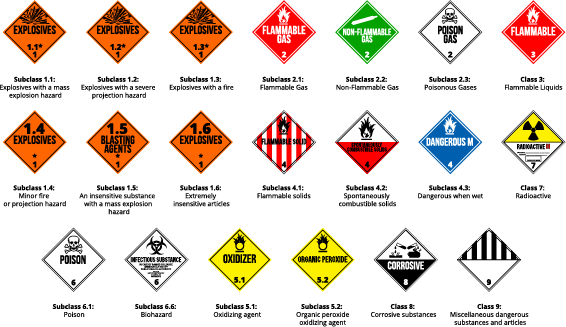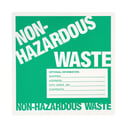
What is the Difference Between Hazardous and Non-Hazardous Cargo?

Not all cargo is classified similarly. Regulations surrounding the proper disposal methods are constructed to recognize that a single disposal method is unsuitable for all materials. The disposal of hazardous materials takes a different approach than non-hazardous materials, so before disposing of cargo, recognize the difference between hazardous and non-hazardous and follow the guidelines set in place.
What is Hazardous Cargo?
Hazardous cargo is considered ‘dangerous goods’ and encompasses substances or materials that pose some type of risk. The risk can be either to people’s health should they come into contact with the materials, or it can be damaging to the property and/or environment. Hazardous cargo also poses safety concerns.
There are nine classes of hazardous cargo and some of which are sub-divided.
-
Class 1 - Explosives
-
Class 2 - Gases
-
Class 3 - Flammable Liquids
-
Class 4/1 / 4.2 / 4.3 - Flammable Solids
-
Class 5.1 / 5.2 - Oxidizing Substances
-
Class 6.1 / 6.2 - Toxic & Infectious Substances
-
Class 7 - Radioactives
-
Class 8 - Corrosives
-
Class 9 - Other Substances and Articles

Shippers are required to prepare and provide the carrier with documentation regarding the materials and should include the type and quantity of the materials and goods along with their respective classification. This information is helpful if an emergency situation arises. All carriers are required to be trained in hazardous material movement and must have a special license/permit. Placards must be visible and display the classification of material.
How is Hazardous Cargo Regulated?
Hazardous cargo for all modes of transport (land, air, and sea) is controlled by regulatory committees both internationally and nationally. According to the United States Department of Transportation (USDOT), "the Secretary of the Department of Transportation receives the authority to regulate the transportation of hazardous materials from the Hazardous Materials Transportation Act (HMTA)." Specifically, within the United States, the DOT and the Environmental Protection Agency (EPA) regulate the handling, transportation, and cleanup of hazardous goods.
What is Non-Hazardous Cargo?
Non-Hazardous cargo are generally goods that are considered safe and do not pose a risk to health, the environment, or anyone's safety.Some examples of non-hazardous cargo include.
-
-
-
Paper
-
Plastics
-
Glass
-
Metals
-
Sugars
-
Lactic acids
-
Bromides
-
Carbonates
-
-
How is Non-Hazardous Cargo Regulated?
Non-Hazardous cargo is usually not corrosive, toxic, flammable, or reactive and does not require a warning label. It also comes with less restrictive transport regulations.
How Do You Dispose Cargo Properly?
Proper cargo disposal requires some care. Regardless of whether the cargo is hazardous or non-hazardous, the disposal needs to be financially and economically efficient while protecting the liability exposures for the manufacturer/shipper, carrier, and insurer. Federal and/or manufacturer disposal requirements are essential to adhere to, especially when disposing of hazardous cargo. The Environment Protection Agency (EPA) regulates hazardous cargo disposal from the point of generation to the final disposal. The disposal guidelines were constructed to minimize the potential risks to human health and the environment.
Disposal authorization or permission, as well as special disposal requirements or instructions, should be obtained from the cargo owner prior to disposal and the disposal should be well documented.
Whether hazardous or non-hazardous cargo is being transported, it is important to understand the regulations surrounding each and to take proper caution when transporting.
Veritas Administrators has a dedicated and experienced team of cargo experts ready to assist. To learn more about our ability to partner with you on your cargo claims, see our “Learn More” button, or feel free to request a phone call.


